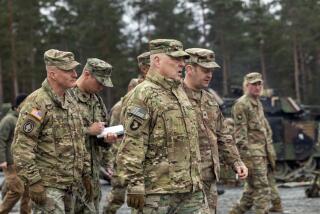‘Historic’ Encounter to Open New Era in Ties : U.S., Soviet Defense Chiefs Meet Today
- Share via
WASHINGTON — The top defense officials of the United States and Soviet Union, Frank C. Carlucci and Gen. Dmitri T. Yazov, meet today in Bern, Switzerland, to usher in an era in superpower relations unmatched even during former President Richard M. Nixon’s policy of detente.
The U.S. and Soviet defense chiefs met once before, during the 1979 summit meeting of former President Jimmy Carter and the late Soviet leader Leonid I. Brezhnev.
But Carlucci, who called his meeting with Yazov “historic,” said this would be the first time the political heads of the military establishments have sat down in a full-scale session with their own agenda.
A senior Pentagon official said the top U.S. and Soviet uniformed military officers, Adm. William J. Crowe Jr., chairman of the Joint Chiefs of Staff, and Marshal Sergei F. Akhromeyev, chief of the Soviet military staff, would meet subsequently in a further erosion of the traditional aloofness of the two defense establishments.
Carlucci and Yazov plan to exchange views on four topics: military-to-military contacts, including sometimes dangerous activities; regional issues, such as the conflict in the Persian Gulf and Afghanistan; military doctrine and strategy, and arms control.
Because they will not be negotiating, no substantive agreements or even changes in position are expected. But the meetings, to stretch over three days, should help each side to better assess the other’s intentions and so better plan its own programs, a senior Defense Department official said Monday.
The two officials offer a combination of similarities and contrasts, and the establishments they head appear to be undergoing significant changes in defense posture.
Both men are career government officials with no independent political bases. Each came to his job unexpectedly.
Carlucci, who has been an ambassador, Budget Bureau official, deputy director of the CIA and presidential national security adviser, was named to the Pentagon post after Caspar W. Weinberger resigned several months ago.
Complained About Training
Yazov was born in Siberia and reportedly came to the attention of Soviet leader Mikhail S. Gorbachev when he complained that the men of his Far East command were poorly trained and disciplined. Moved to Moscow as deputy chief of staff for personnel in February, 1987, he was catapulted into his current job four months later when Defense Minister Sergei L. Sokolov was fired after a young West German pilot landed unopposed in Red Square.
But physically and temperamentally, they appear quite different.
Carlucci, 57, is a slight, unflappable Princeton graduate.
Yazov, 65, a beefy man described by one diplomat as looking like the “quintessential Slav,” showed a fierce temper on Soviet television recently when he harshly condemned criticism by the public and Soviet reporters of the performance of Soviet troops in Afghanistan. One person who saw the program described Yazov as irate and “ready to burst” with anger.
The meeting of the two defense leaders, which has been discussed on and off for almost a decade, comes at a time when the U.S. and Soviet military are changing significantly--but in apparently different ways.
U.S. defense budget and military forces are shrinking, although the Pentagon admits no change in doctrine. The Soviets, on the other hand, seem to be proclaiming a new defense doctrine, but no change in its forces or weapons has yet surfaced.
Carlucci has begun to cut an estimated $300 billion over five years from previous Reagan Administration plans by reducing the size of U.S. forces. He said last week: “I prefer a smaller military force fully capable rather than a larger but hollowed-out force,” of the sort that the Pentagon maintained during the 1970s.
The Soviets, under Gorbachev’s broad perestroika (restructuring) philosophy, have introduced the concept of “sufficiency” into their military doctrine. This suggests the Soviet defense establishment will be given less money in the future, much as the use of the same word by Nixon more than a decade ago signaled a cut in U.S. defense spending.
In a hint of disagreement, however, Soviet civilian officials speak of “reasonable sufficiency,” while the Soviet military talks of “defense sufficiency.” Carlucci intends to ask Yazov what the Soviet military means by “sufficiency” and whether it will lead to changes in actual military posture, particularly in Europe.
“We’re not going to be negotiating defense budgets,” the senior Pentagon official said Monday. But the Carlucci-Yazov discussions, he added, could give indications “where the Soviets are heading in defense planning, particularly as they prepare their next five-year plan.”
More to Read
Sign up for Essential California
The most important California stories and recommendations in your inbox every morning.
You may occasionally receive promotional content from the Los Angeles Times.













